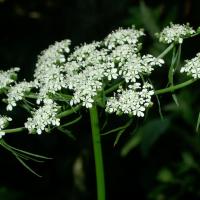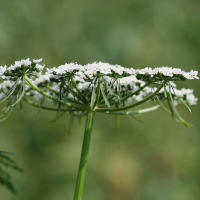Poison parsley
Aethusa cynapium
Aethusa cynapium, commonly known as fool's parsley, is a highly toxic plant belonging to the Apiaceae family. Native to Europe and Asia, it has spread to various parts of the world. Here's an informative description of Aethusa cynapium:
Appearance:
-
Growth Form:
- Fool's parsley is an annual herb with a slender, erect stem that can reach heights of about 20 to 80 centimeters (8 to 31 inches).
-
Leaves:
- The leaves are finely divided and arranged alternately along the stem.
- They have a lacy or fern-like appearance.
-
Flowers:
- The small, white flowers are arranged in umbels, similar to other plants in the Apiaceae family.
-
Fruits:
- The fruits are small and ribbed, containing two seeds.
Identification:
-
Leaf Characteristics:
- The finely divided, lacy leaves are characteristic of fool's parsley.
-
Umbel Arrangement:
- The arrangement of small white flowers in umbrella-shaped clusters (umbels) is a key identification feature.
Habitat and Distribution:
-
Habitat:
- Fool's parsley is commonly found in waste areas, gardens, cultivated fields, and disturbed sites.
-
Distribution:
- It is native to Europe and Asia but has become naturalized in North America and other regions.
Toxicity:
- Highly Toxic:
- All parts of the plant, especially the leaves and seeds, contain toxic compounds, including falcarinol and falcarindiol.
- Ingesting even small amounts can be lethal to humans and animals.
Management:
-
Control Measures:
- Due to its extreme toxicity, control measures are often necessary, especially in areas frequented by livestock or where there is a risk of accidental ingestion.
- Manual removal, mowing, or herbicide application can be used for control.
-
Preventive Measures:
- Preventing the spread of fool's parsley seeds and monitoring disturbed areas can help prevent new infestations.
-
Awareness:
- Raising awareness about the plant's toxicity and educating individuals who might come into contact with it is essential.
-
Personal Protection:
- Protective clothing should be worn when handling fool's parsley to avoid skin contact and inhalation of toxic compounds.







